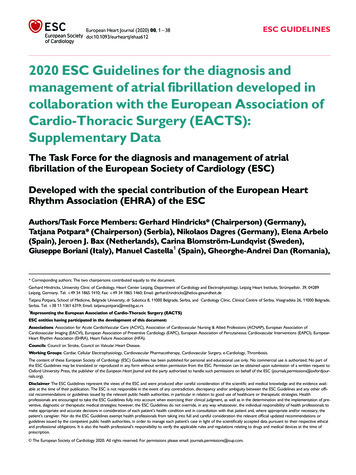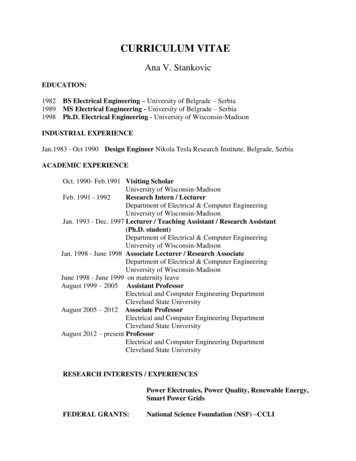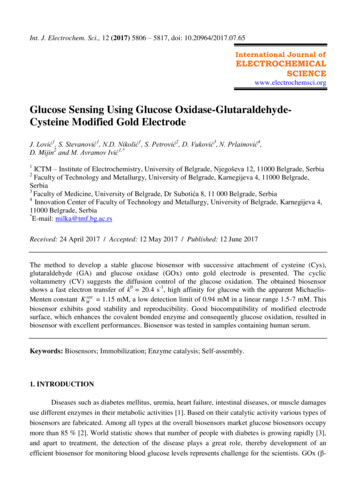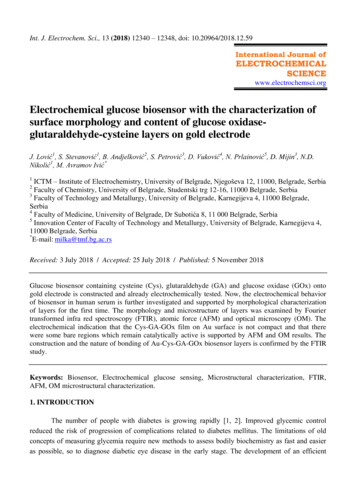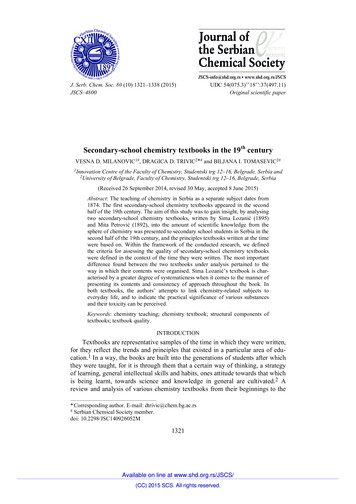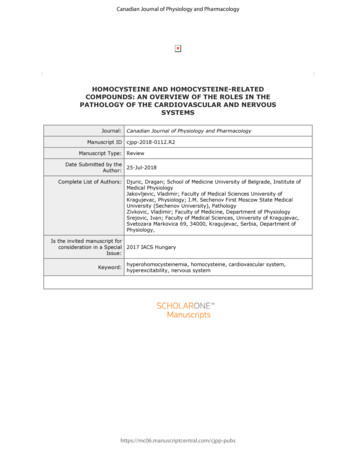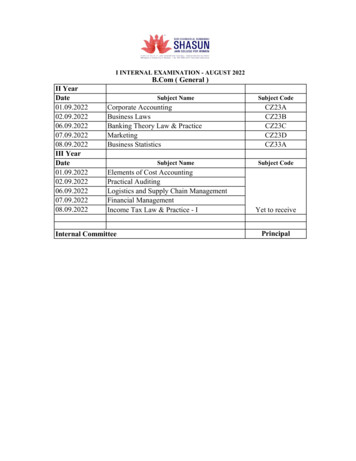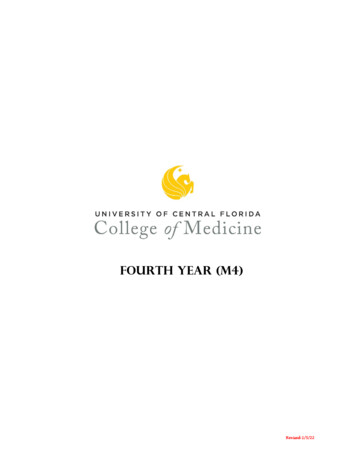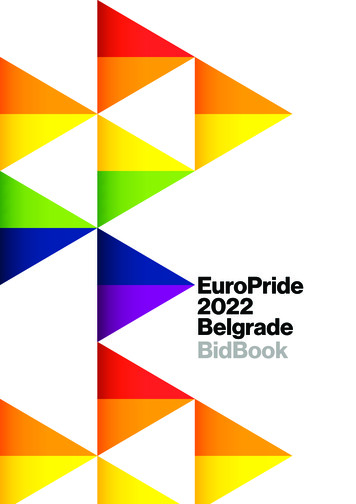
Transcription
EuroPride2022BelgradeBidBook
CONTENTSABOUT USCivil Rights DefendersDa Se Zna!HeartefactGetenIzađiYouth Initiative for Human RIghts (YiHR)LGBT LIFE IN SERBIAIn a NutshellFacts and figures4–75556678–989WHY BELGRADE?10 – 15ABOUT BELGRADE16 – 17EURO PRIDE 2022 EVENTSBelgrade Pride HousePride ParkInternational Pride ForumPride ArtClosing CeremonyMARKETING PLANVision and identityPromotion @ PrideSocial mediaTimelineCooperation with local authoritiesTelevision & Press161617171720 – 21202021212122 – 23222222222323BUSINESS PLAN24 – 25LETTERS OF SUPPORT26 – 35CORE TEAM36 – 37Follow Us36BelgradePride2022EuropePrideBidBookHistoryWhat to doWhere to stayLGBT in BelgradeHow to get there
Belgrade Pride and Pride Week is an annualevent aimed at promoting and empoweringSerbia’s LGBT community. Belgrade Pridehas become the leading Pride in the WesternBalkans and serves as a hub for dialogueand mutual cooperation of regional LGBT organizations and activists, contributingto the development of a Western Balkansnetwork of human right defenders. Eachyear Belgrade Pride is host to LGBT activists from all over the region. Theyplay an integral role in Belgrade Pride byparticipating in lectures, workshops andother activities that strengthen the regionalcooperation despite the lack of cooperationfrom their respective governments.Photo for Beta by Emil Vas4Through participation and cooperationwith human rights organizations and humanrights defenders, Belgrade Pride has becomethe most visible platform for the promotionof human rights of the LGBT community inSerbia. Belgrade Pride promotes democraticprinciples and calls on improvement oflegislation relevant for the LGBT community.The first attempt of organizing BelgradePride in 2001 ended with extreme violencefrom right-wing groups. The second attemptin 2010 was more successful in terms ofPride actually taking place, but thousandsof anti-Pride protesters clashed with policecausing city-wide riots. Since then, BelgradePride, with the help of several human rightsorganizations, has succeeded in overcomingsecurity challenges and have successfullyorganized consecutive, safe Belgrade Pridessince 2014 and Pride Week events since 2010.These events were crucial in empoweringLGBT activists and raising the of visibilityLGBT rights and issues in Serbia.Photos by Vesna LalićThe continued emphasis on organisingBelgrade Pride despite past obstacles hasmade it a cornerstone and platform forhuman rights, and for all citizens that thinkand act differently. After years of tirelesslyworking, it has become clear that the weeksjust before Pride is the only period when thegovernment is ready to give commitmentson the improvement of human rights forthe LGBT community; thus enforcing ourvital role in upholding and promoting suchissues.The LGBT communities across theBalkans struggle with similar difficultiesand setbacks as the LGBT communityin Serbia; from outright discrimination andhate speech, to stubborn governmentsrefusing to pass or implement proposedlaws to advance equality.Belgrade Pride has set precedentsin many regards that have acted asguidelines and motivators for otherregional communities. It is hearteningto enjoy friendship and solidarity acrossborders when it comes to human rightsdefenders working together, despite thelack of cooperation amongst governmentsin the region. Fellow LGBT activists havesent letters of support to Belgrade Pride,and agree that Belgrade Pride’s hosting ofEuroPride would be a major milestone for theentire region.Belgrade’s Pride Week and Pride Paradehave been growing in size and importancefor the last 6 years, and their increasingpopularity and visibility is an important signof progress for LGBT lives. In the last severalyears, Belgrade’s Pride celebrations havebecome less policed and have happenedsafely without incidents.The main organization that wasworking on Belgrade Pride was “BelgradePride Parade”. Since the founders of theorganization got political asylum in Canada in2016, six different human rights organisationsjoined together to form the Belgrade PrideOrganizing Committee in order to carrythe legacy of “Belgrade Pride Parade” andcontinue the organization of Belgrade Prideand Pride Week.Belgrade Pride Organizing Committee isin the process of opening a new organisationthat will be formally and legally responsible forBelgrade Pride as well as EuroPride. The de2022EuropePrideBidBookAbout us
organisation will represent the decisionsand plans of action that the OrganizingCommittee of Belgrade Pride brings. Theopening of the new organisation will becompleted in August 2019, after which itwill become a member of the BelgradePride Organizing Committee. Currently,the organizations that are members of theOrganizing Committee are:Civil Rights DefendersActs to partner with and support humanrights defenders who work in some of theworld’s most repressive regions on fourcontinents. Through advocacy, litigation,and public campaigns, they aim to advancepeople’s rights globally. Civil RightsDefenders was founded as the SwedishHelsinki Committee for Human Rightsin 1982 with the purpose of monitoringcompliance with the human rights provisionsof the Helsinki Final Act.6Da Se Zna!Meaning “Let It Be Known!” this organisationis based on an online platform for safeand anonymous reporting of violence anddiscrimination. In addition to recordingdiscrimination, hate crimes, and cooperatingwith LGBT people who have experiencedviolence, Da Se Zna! works with the relevantinstitutions at the local and national level,mobilises and raises the capacity of theLGBT community and focuses their workon social networks.HeartefactHeartefact strengthens critical awarenessand builds an open and free society in theregion of the Western Balkans throughcreative, expert, and artistic exchange.Founded in 2009, Heartefact supports andencourages contemporary and engagedcultural and artistic creativity, and thuscreates the conditions for producing a newgeneration of progressive individuals.GetenOriginating from the first Gay and Lesbianlobby organisation, Arkadia, in 1990, Getenhas long campaigned against discriminationand homophobia, and promoted freedomof expression and identity. Geten is the firstall-inclusive organization that, in additionto lesbian and gay men, brings togetherbisexual, trans-persons as well as intersex,queers and heterosexuals, affirming theirrights, needs, problems, existence andculture.IzađiMeaning “Come out” a grassrootsorganisation. Formed in 2010, and basedout of Novi Sad, which advocates for LGBT rights at the national and local level. Theyaim to improve the quality of life for youngLGBT people, and to provide social andpsychological support. They also aim toimprove public perception and treatment ofLGBT youth in Serbia. They have recentlystarted collecting LGBT stories, with the ideaof sharing experiences among the community.This was inspired by a Belgrade Pride Weekevent series called Queer Cafe. In 2019, theyopened their office, which became the firstever LGBT community centre in Novi Sad.Youth Initiative for Human RightsThe Youth Initiative for Human Rights (YIHR),founded in 2003, is a regional network of nongovernmental organizations with programson the territories of Serbia, Kosovo, Croatia,Montenegro and Bosnia and Herzegovina.The Initiative was formed by young peoplefrom these countries in order to enhanceyouth participation in the democratization ofthe society and empowerment of the rule oflaw through the process of facing the past andestablishing new, progressive connections inthe post-conflict region of former gradePride2022EuropePrideBidBookPhotos by Vesna Lalić
BelgradePride2022EuropePrideBidBookLGBT life in SerbiaIn a nutshellBeing LGBT in any of the WesternBalkan countries is a challenge. Not onlyis there a lack of legislative framework (orimplementation of existing ones), socialattitudes towards sexual and genderminorities are far from tolerant andaccepting. During the turbulent ‘90s, anydiversity was outright bashed in the media,leading to the recession of openness bythe general public. LGBT members wereportrayed as sick; an embarrassment totheir family, community and country. Thepolitical regime made it difficult for activiststo openly fight for human rights andtolerance, there was no representation ofnon-heteronormative people and violencetowards those perceived as LGBT was notpersecuted.Even in such hard times, a numberof activists opened the first pro-LGBTorganization “Arkadija” in Belgrade.Required by law to present five valid NationalIDs in order to register the organization,five heroic women stepped up and tookthe risk. Stemming from “Arkadija”, otherorganizations followed, leading to the firstattempt of Belgrade Pride in 2001.Even during the Communist era, therewere venues in Belgrade that were knownto be a gathering place for mostly gay men.The first gay clubs opened in the ‘90s asunderground venues that were promotedby word-of-mouth. By the early 2000’s,Belgrade had several gay bars and clubs. Itwas common for the patrons to be beaten up,police were reluctant to provide protection orto pursue the perpetrators of the attacks, andworse yet, the victims often faced secondarydiscrimination by the authorities.After the violent Pride in 2001, manyorganizations focused their work onimproving the police force; a long processthat finally achieved results post-2010 whenthe police finally started protecting LGBT events and actually arresting perpetratorsof violence. Along with heightened visibilityof the community and its issues, Belgradehas grown on to become far safer for LGBT members.Nowadays, nightlife is far more acceptingof LGBT patrons. Many clubs that playelectronic music have a queer-friendly policy,and many same-sex couples and queerpeople are free to enjoy the parties withoutdiscrimination. Even in mainstream clubbing,the atmosphere is far more relaxed. Belgradetoday has several gay venues, bars popularfor trans people, and even a nudist beachpredominantly for LGBT persons. In the lastcouple of years a completely new drag scenein Belgrade has developed. Over 30 dragqueens a and a couple of drag kings regularlyperform in various venues in Belgrade andsome of them are hosting their own partiesthat attract many visitors, mostly LGBT youth.Facts and figuresAccording to relevant surveys andpublic opinion polls conducted in 2018,discrimination based on the grounds ofsexual orientation and of national affiliationand ethnic origin is still widespread in Serbia.In its Serbia 2018 Report, the EuropeanCommission (EC) said that LGBT personswere among the most discriminated groupsin Serbia and that they often faced hatespeech, threats and violence. The ECcalled on Serbia to promptly and properlyinvestigate, prosecute and sanctionsuch abuses. The Commissioner for theProtection of Equality issued only threeopinions in 2018 regarding complaints in thefield of information and found violations of theprohibition of discrimination on grounds ofsexual orientation.In 2009, Serbia introduced a relevantlegal framework that was supposed toguarantee the safety of LGBT people, but thishas not been fully implemented. Even thoughthe status of LGBT people has significantlyimproved since 2000, the safety of LGBT people is still at risk. Attacks on the LGBT community are common, but their exactnumber is not known due to reluctance toreport them. As a result, many crimes remainunreported, unprosecuted and thereforeinvisible.The Laws on Registered Same-Sex CivilPartnerships and on Gender Identity are notyet in the enactment procedure. Prejudicesare widely present and relevant research’sfindings from 2018 show that 80% of the totalpopulation of Serbia would not want a LGBT person as their neighbour and only 20% claimto know and to have communicated with anLGBT person. The Pride parade, which nowtakes place every year and in which policepresence is reduced every year, representsan improvement of LGBT people’s status.However, the parade by itself is insufficient.At the beginning of October 2018, theFirst Basic Court of Belgrade issued thefirst ever verdict regarding a hate crime. Thisverdict marks a precedent for the Serbianjudiciary system, since the relevant article ofthe Criminal code which defines hate crimehad never been used in practice, even thoughnecessary legislation had been introducedback in 2012.The Court found that a thirty-year-oldman, a member of LGBT community, whohad been subjected to domestic violenceby his family, had been a victim of a hatecrime. This verdict was the first ever in theSerbian judiciary system in which the motiveof the crime was taken into account as anaggravating circumstance.Photos by Vesna Lalić89
The 50th anniversary of the Stonewalluprising proved an important milestone forthe LGBT community worldwide. It servedas a celebration of the remarkable stepsPride movements have made to achieveacceptance and legislative change in theirrespective societies, and as a powerfulmoment for reflection on how long andwinding the struggle towards equality trulyis. Yet, somewhere behind the celebrationsand street parades the spirit of Stonewallyearns to be recaptured.Within Europe, nowhere is this starkcontrast between success and strugglemore prevalent than in the Western Balkans.This geographic crossroads between Eastand West also represents a crossroads ofvalues. To its West, rainbow flags decoratetown halls while corporate and politicalleaders race to display LGBT symbolsthroughout Pride Month. To its East,members continue to be harassed, beatenand persecuted by the very institutionsintended to protect them. The WesternPhoto for Blic by Andrija Ilić10Balkans are, therefore, the natural frontlinefor Europe’s Pride movement to take its fightto the next stage.The entire region still bears socioeconomic scars from the wars which ravagedit in the 1990s. Political tensions remainhigh between governments, which in turnheightens levels of nationalism, as well asa cultural attachment to traditional values,within society. These factors have drasticallyhindered the region’s democratisationprocess, including its integration to theEuropean Union. Coupled with everydaydiscrimination of minority groups, a right-wingmedia landscape and the absence of basicfreedoms of expression, the Western Balkansis region desperate for systematic change.One minority group which has remarkablyendured in these tough circumstances hasbeen the LGBT activist community. Atthe turn of the millennium, the entire regionwatched in horror as LGBT activists werebrutally beaten in Belgrade’s first attempt tohost a Pride Parade. As the biggest and mostculturally diverse city in the region, it servedas a harsh warning that the fight for equalrights and acceptance in the Western Balkanswould be the steepest of uphill challenges.In 2010, the struggle was tested once againas Pride marchers were met with counterdemonstrators who pursued to violence andrioting across Belgrade’s city centre. Yetthrough sheer dedication and bravery, thecommunity has grown, consolidated andtaken momentous leaps towards a brighterfuture.Since 2014, Belgrade has successfullyhosted annual Pride events – without anymajor disruptions or incidents. Attractingseveral thousand participants from Serbiaand neighbouring countries each year, itrepresents the foundation upon which LGBT activism is developed in the region.In August 2018 Belgrade Pride openedPride Info Centre as an open and inclusivespace that serves as a social and creativity hub,and a venue for exhibitions, performances,movie screenings, conferences, debatesand discussions organized by LGBT organizations in Serbia. In its first 6 monthssince opening, Pride Info Centre has hosted77 events and welcomed on average 100visitors per day. Encouraged by these positivedevelopments, multiple events promotingLGBT rights and issues have sprung up inBelgrade in recent years, while the southernSerbian city of Niš also hosted its ePride2022EuropePrideBidBookWhy Belgrade?Photos by Vesna Lalić11
12BelgradePride2022EuropePrideBidBookevents in the region’s biggest and mostvibrant city. All things considered, thediscourse on LGBT rights and issues isgoing through a drastic shift in the Balkanstoday, and as such, all forms of internationalsupport will immensely empower the Pridemovement and its objectives.Each of these have, in turn, contributedto wider acceptance by states in the region.The standout recognition arrived in August2016 when Serbia’s government appointedAna Brnabic, a lesbian, to the Ministryof Public Administration and Local SelfGovernment. In June 2017, Ms Brnabic waspromoted to Prime Minister – becoming thesecond ever lesbian head of governmentin the world (after Iceland’s JóhannaSigurðardóttir).Regrettably though, this momentum hasfailed to trickle down to mainstream society,media or, by extension, businesses. Over thepast few years, Belgrade Pride has reachedout to over 300 companies in Serbia (bothlocal and international), seeking some formof cooperation – logistical, promotional orfinancial. Presumably fearing stigmatisationor a backlash from conservative customers,only a handful of firms agreed to a meetingand not a single one has provided supportof any kind. However, since Skopje Pridemanaged to secure recognition from CocaCola this year, there is growing optimism thatthe situation is changing, and that it could takea single breakthrough event – such as hostingEuroPride – to tip the balance once and for all.EuroPride will serve as a pivotal moment in thefight for the advancement of human rights ofthe LGBT community in the Western Balkans.The successful EuroPride bid will be a keymotivating factor for companies to supportBelgrade Pride and other Prides in the region.EuroPride in Belgrade will also encouragelawmakers to advance legislative changesand more closely monitor hate crimes andprotect citizens from discrimination. Theywill not want Serbia to attract internationalattention to its lack of equality legislation andprotections for LGBT people.BelgradePride2022EuropePrideBidBookPride event in 2017 and Novi Sad, in Serbia’snorthern province of Vojvodina, hosted its firstpride in May 2019.Yet, perhaps one of the biggestachievements of Belgrade Pride has beenthe momentum it has spurred for LGBT activism in neighbouring countries. Throughconstant networking, activists from theregion – where cross-border cooperation isotherwise dire - have come together in a raresign of unity to support Pride and its valuesin each other’s societies. Thus, incidentswhich marred Belgrade’s first Pride in 2001,inspired a struggle across the region, leadingto inaugural Pride events in Zagreb (2002),Sofia (2008), Montenegro (2013), Tirana(2014) and Pristina (2017). Best yet, in 2019Sarajevo and Skopje will join the family andfinally the rainbow flag will proudly fly over allof the Western Balkan’s capital cities. Activistsfrom Belgrade have tirelessly committedformal and non-formal support to each ofthese organisations, and vice-versa theyare regular visitors and participants at PridePhotos by Vesna Lalić13
For Belgrade and the region,hosting EuroPride 2022 will:Bring much-needed visibility to the LGBT causeamongst wider society in the Western Balkans, suchas encouraging acceptance and equalityBelgradePride2022EuropePrideBidBookPromote European values such as respect forhuman rights, tolerance and democratisation at acritical, transitional time for the entire regionTranscending boundaries by hosting EuroPrideoutside the European Economic Area for the firsttime ever1Recapturing its grassroot activist core and leavinga legacy in a region where the LGBT communityis still systematically discriminated against andfundamental challenges remainBelgradePride2022EuropePrideBidBookPressure governments in Serbia to implementlaws concerning LGBT rights which are yet to beenforced, and encourage the passing of new lawsFor EPOA members, selecting Belgradeas the EuroPride 2022 host will mean:Enjoying a city which is well-connected, cheap,fun, hospitable and, above all, safeIncentivise businesses to engage with LGBT organisations and support their actions, which iscrucial for Pride’s long-term sustainabilityEmpower the community of LGBT activists fromacross the Western Balkans to continue their fight,and provide them with a much-deserved sense ofvalidation for their struggle so far1415
About BelgradeHistoryTraces of this rich past can be found acrossthe city; from the landmark 6th centuryKalemegdan fortress to the cobblestoneSkadarlija Street, and the posh 19th centurydecadence of Dorćol, which often remindsvisitors of Paris’ Montmartre, interspersedwith timelessly traditional Balkan houses.The entire city centre fits roughly insidea 3km radius. One can cross the SavaRiver by foot over Branko’s Bridge for amemorable panoramic view, and end up in anew world of wide avenues, shopping malls,extensive parklands and riverside walks inNew Belgrade.It is a blend of elegant traditional andunique brutalist architecture; reminding itsbeholder of Vienna, Berlin, Paris, Moscow,Bucharest; even glimpses of 19th centuryIstanbul. Historically and culturally speaking,Belgrade has been located at the frontier ofthe divide between Western and EasternEurope. The foothold in the West keepsBelgrade open to new ideas and values,while also maintaining a close cultural link tomore conservative traditions it shares withEastern philosophies. An article recentlypublished in Vogue, entitled ‘Is Belgrade theNew Berlin?’, perfectly depicts this stunningparadox.The city has a very resilient spirit andthe people of Belgrade are accustomedto overcoming difficult challenges. The16city has fallen under occupation attacks orbombardments no less than 22 times in itshistory – most recently in 1999 - and each timeit has risen from the ashes, more vibrant thanever before.What to doThere are any number of museums in the city,which offer a glimpse into Serbia’s rich historyand culture. A popular favourite is the NikolaTesla Museum, where visitors experiencefirst-hand some of the famed scientist’sgreatest inventions and pay respects to hisashes. Remains of the iconic Yugoslav leader,Josip Broz ‘Tito’, can also be found in Belgradeat the Museum of Yugoslav History, in his finalresting place, The House of Flowers. In the lasttwo years, some of Serbia’s most illustriousmuseums have opened their doors to visitors.The National Museum and the Museum ofContemporary Art had both been closed forover a decade until 2018 and have sincebeen reopened to an enthusiastic reception.In July 2019, the BBC claimed Belgrade tobe one of the top five most creative cities inthe world.Belgrade has no shortage of parks andgreen walking spaces. Cafe culture thrivesfrom the moment the sun comes out, andthe numerous pedestrian areas, tree-linedstreets, and plentiful markets offer no end ofalluring diversions. Residents and touriststypically cool off at Ada Ciganlija, an islandin the middle of the Sava river which offerscanoeing, kayaking, paddle-boating andswimming. This 6km long stretch of landis filled with small cafes, sports fields andseemingly endless nature.With the price of coffee typically 1,traditional meat dishes – Cevapi andPljeskavica - around 2, and a pint of beer ata local bar less than 2, enjoying Belgrade’shospitality is far too ide2022EuropePrideBidBookBelgrade (Beograd) is the capital of Serbia, with a population of around 1.6 million. It issituated in South-Eastern Europe, on the Balkan Peninsula, at the confluence of theSava and Danube rivers. It is one of the oldest cities in Europe and has, for millennia,been an important intersection of Eastern and Western civilisation.Left: Kalemegdan fortressTop right: Belgrade skylineRight: Cafe Šupa, Park TopčiderBottom right: Museum ofContemporary Arts17
NightlifeIn recent years, Belgrade has becomerenowned for its truly epic nightlife, withdiverse clubs and bars lining its streets.Unique to Belgrade are the party boats, orsplavs, moored along the river. They rangefrom domestic Serbian to international DJsand cater to a multitude of musical tastes.As with so many capitals across Europe,Serbia’s electronic scene has been animportant gateway for acceptance andtolerance towards LGBT members. Bornout of resistance to the nationalist discourseof the 90s, the scene has surged into themainstream and today boasts two globallyfamed festivals, Exit and Love Fest. Thereare also a number of queer-friendly venues,such as KC Grad, 20/44, Musk Machine,XL Klub, or the legendary techno spotDrugstore. In the summer and particularlyaround Pride week, the city truly neversleeps.city’s improving connectivity with Europeanand world capitals. Namely, Belgrade’sNikola Tesla Airport is served by 36 differentairlines to 67 destinations worldwide. Thecountry’s flagship carrier, Air Serbia, hasdirect daily flights to London, Berlin, Rome,Amsterdam, Paris, Copenhagen, Stockholm,Oslo, Zurich, Vienna – as well as New York,Istanbul, Abu Dhabi and Moscow. Europeanlow-cost airlines, such as Wizz Air, EasyJet, Transavia and Vueling also fly directinto Belgrade. Additionally, visitors can flyinto Serbia through the southern city of Niš(200km from Belgrade), which boasts a directroute to Berlin with Ryanair. An increasinglypopular alternative route to Belgrade is viaBudapest Airport (320km away), which isbetter connected to the Iberian Peninsula,and thereafter catch a minibus departingevery hour for one-way fee of 25 ride2022EuropePrideBidBookWhere to stayBelgrade also boasts some of the cheapestaccommodation in Europe. The averageprice for an entire central flat for 2 peopleon Airbnb ranges from 16- 32 per night, inthe high season. Hotels are also affordablypriced, with double rooms in four and fivestar hotels starting at 52 per night.From top to bottom:WB party hosted at Dom OmladineKC GradExit Festival in Novi SadHow to get thereThe city is witnessing significant growthin tourist numbers year-on-year. In 2018,Belgrade welcomed 1,589,000 foreigntourists – an increase of 15% from theprevious year, mainly down to a flow inAmerican, German, Chinese and Israelitourists. A major contributing factor is the1819
In 2018, Belgrade Pride had successfullyorganized over 70 events during Pride Week.Focusing on LGBT culture, historyand contemporary challenges, throughexhibitions, theatre and movie screenings, wegive support to young and established artists,providing them with a platform to discussgender, sexuality, identity and other relevanttopics in their work. We also pay attentionto the needs of human rights defendersand youth enthusiastic about engagingwith civil society. By organizing workshops,trainings, panel discussions and exchangingexperiences that serve to empower currentand future activists, we teach them strategiesand methods to combat discrimination,advocate for rule of law and strengthen ourcollective fight for equality. In tackling thelack of acceptance of LGBT people withinBalkan society, we always seek to broadenthe appeal of LGBT issues and stress theirgravity for an open and tolerant society, byorganizing public debates and events thatoffer an insight in Pride movements and theLGBT community as a whole.In this spirit of education, creativity,celebration and activism we will plan ourprogram for EuroPride 2022.The main part of EuroPride Belgrade2022 will be Pride Week, that will kick-offwith the opening ceremony on Monday 12thSeptember and conclude with the PrideMarch and Pride Concert on Sunday 18thSeptember. It will include a plethora of events20organized by Belgrade Pride and otherindependent groups, activists that will applyto partake in Pride Week. They will focusaround the following venues and festivities:Pride Info CenterOpened in 2017 as the first publicLGBT space in Belgrade that serves toraise awareness about the community,its issues and challenges, and as aninformation point about Belgrade Prideand the LGBT movement. The first PrideInfo Centre was opened a month beforeBelgrade Pride 2017 and served as a pilotproject. After an overwhelmingly positiveresponse, we moved to a larger venuewhere we regularly host lectures, debates,exhibitions, community-oriented activities,HIV testing, etc. The new Centre has beenfully functional since 2018. Pride Info Centrewill serve as the main info point of Belgrade’sEuroPride 2022 and we plan to host manyevents there.Belgrade Pride HouseIn 2018 we’ve partnered up with CulturalCentre Grad (KC Grad) that served as‘Pride House’ during Belgrade Pride 2018.We will continue this tradition of having aPride House during Belgrade Pride whereevents for larger crowds, such as partiesand gatherings, take place.Pride ParkWe plan on establishing a Pride Park that willserve as a venue for concerts, daytime partiesand for organizations, companies and othersto showcase their work in dedicated booths.We aim to keep Pride Park fully functional forthe duration of the Pride Week in 2022.International Pride ForumOrganized since 2010, International PrideForum gathers activists from the region andthe rest of the world to discuss the positionof the LGBT community in their countries.Activists focus on recent developments intheir regions, as well as topics of interest forthe LGBT community.“Hate Crime, Hate Speech” and “MarriageEquality”. This conference will be a centralevent for activists during EuroPride 2022in Belgrade and we’ll aim to attract globallyrenowned guest speakers.Closing CeremonyThe closing ceremony will take part afterthe Pride March in the Pride Park andwill consist of closing speeches by theorganizers and regional activists, as well aslive music, drag and cabaret performancesand the hand-off ceremon
working on Belgrade Pride was "Belgrade Pride Parade". Since the founders of the organization got political asylum in Canada in 2016, six different human rights organisations joined together to form the Belgrade Pride Organizing Committee in order to carry the legacy of "Belgrade Pride Parade" and continue the organization of Belgrade Pride
